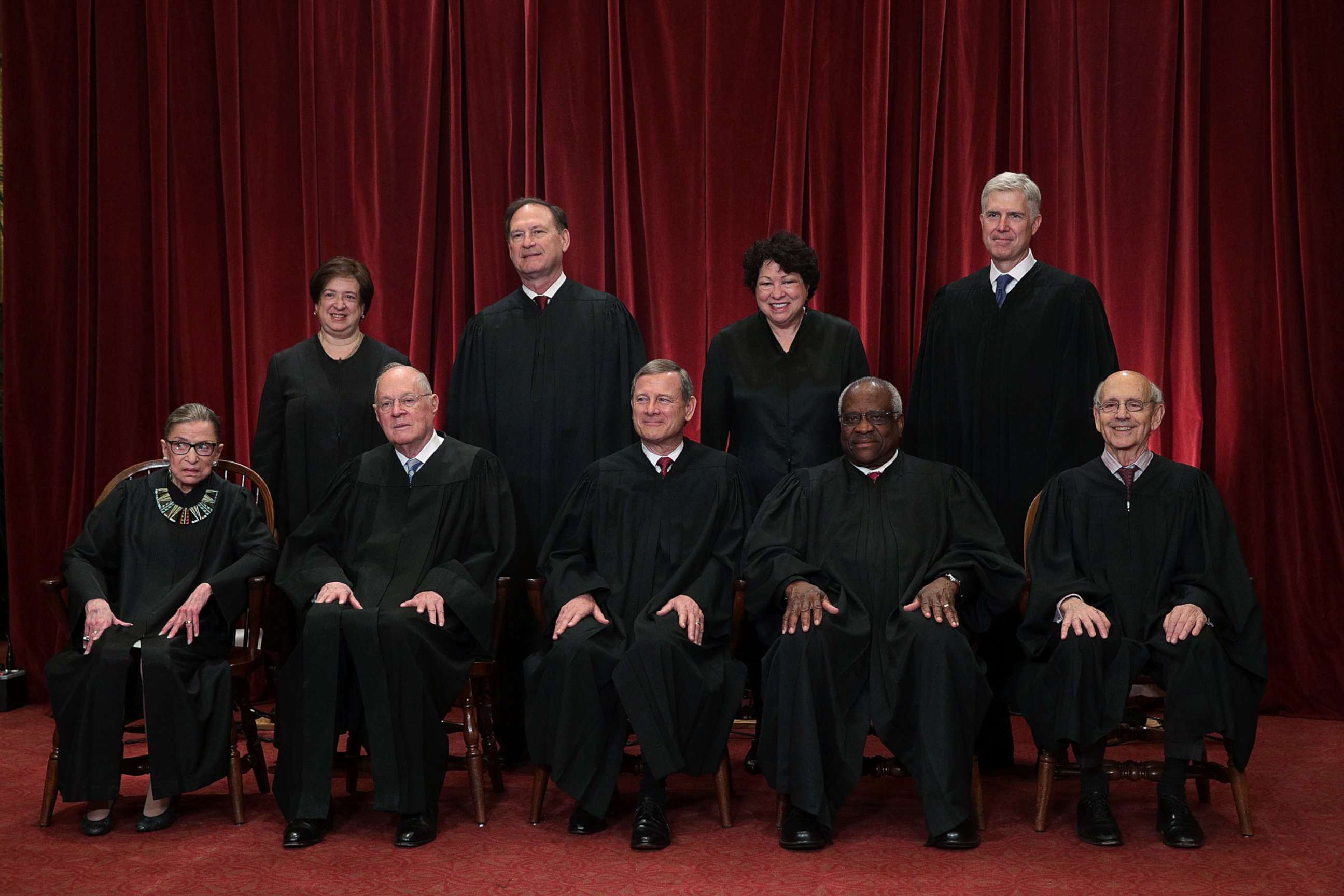Supreme Court in new term to weigh political gerrymandering, other high-stakes cases
The pivotal role of Justice Kennedy will be on full display in new term.
— -- The Supreme Court begins a new term today that will be packed with high-stakes cases on issues from partisan gerrymandering to whether private outfits such as a bakery can refuse service to same-sex weddings.
Also to come before the court is a case about dues-paying to public-sector unions.
The new term will be the first full one for the court's newest member, Justice Neil Gorsuch. And with all the crucial cases before the court, the pivotal role of Justice Anthony Kennedy will be on full display.

Below are the big cases we’ll be watching.
One case not on the list is a challenge to the President Donald Trump's "travel ban" executive order, which bars admission to the United States for individuals from a number of Muslim-majority countries. The court was initially scheduled to consider that case on Oct. 10, but after Trump issued a new proclamation on the matter last week, the court canceled its previously scheduled arguments and asked for a briefing on how the new proclamation affects the existing case. If the court restores the case to its calendar, it will be one of the biggest issues before the justices this term; but there’s a real chance the court won’t hear it at all.
Gill v. Whitford (partisan gerrymandering) -- Oct. 3
The court has agreed to hear Gill v. Whitford, a political gerrymandering case out of Wisconsin that is likely to be one of the biggest election law cases in decades.
Gerrymandering, the drawing of legislative districts for partisan advantage, is a common practice. This case asks when the consideration of politics in redistricting crosses the line from ordinary partisanship to something so excessive as to be unconstitutional.
The Supreme Court has said that courts can decide these cases, but has never explained how to decide when partisanship crosses the line.
A lower court found that a Wisconsin districting map that heavily favored Republicans -- with as one result, the GOP winning 60 of the state's 99 Assembly seats even though they held just 48.6 percent of the statewide electorate -- was unconstitutional.
If the Supreme Court agrees with the lower court that this Wisconsin plan was unconstitutional, it would mark a major change, both in constitutional law, and in the way in which redistricting is carried out in virtually every state.
Masterpiece Cake Shop v. Colorado Civil Rights Division (legality of refusing to participate in same-sex wedding) -- argument not yet scheduled
This case involves a Colorado baker’s denial of service to a same-sex couple. It arose when a gay couple planning their wedding made an appointment to discuss a custom wedding cake. When the baker learned they were a same-sex couple, he indicated that he would be willing to sell them other baked goods, but that he did not make cakes for same-sex weddings.
Colorado has a state law that prohibits discrimination on the basis of sexual orientation, and the couple filed a complaint with the Colorado Civil Rights Division, which agreed that the baker’s conduct violated state law. The Colorado state courts agreed.
The baker is now before the Supreme Court, arguing that the Colorado law violates the Constitution, both by requiring him to violate his religious beliefs, and also by compelling him to bake -- which he describes as a form of artistic expression -- a particular cake for a particular event not of his choosing.
Carpenter v. United States (warrantless use of cell site data) -- argument not yet scheduled
This case asks whether police need to get warrants before asking cellphone companies for cell site data that reveals information about customers’ movements and locations. The case is viewed as the most important Fourth Amendment case in many years with significant implications for both privacy and government surveillance.
Epic Systems Corp. v. Lewis (enforceability of arbitration agreements in employment disputes) -- Oct. 2
This case involves the enforceability of employment agreements that contain provisions in which workers agree to resolve employment disputes (things like wage-discrimination and job-discrimination claims) through individual arbitration proceedings, rather than class or collective proceedings. Although the federal government initially supported the employees arguing that the provisions were not enforceable, it has since switched sides, so the Department of Justice will be supporting the employers, while the National Labor Relations Board, another government entity, supports the employees.
Christie v. NCAA (constitutionality of federal law prohibiting states from legalizing gambling) -- argument not yet scheduled
In this case, New Jersey challenges a federal law that prevents states from legalizing sports gambling. New Jersey argues that this law violates the Tenth Amendment’s “anti-commandeering principle,” which limits the degree to which the federal government can compel the states to enforce federal law. This case is narrowly about sports betting, but more broadly about the federal government’s authority over the states, which could have significant implications for debates about sanctuary cities, among other things.
Janus v. AFSCME (funding of public-sector unions) -- argument not yet scheduled
In this labor case, the court will consider whether public-sector unions may require nonmembers to pay union dues. The Supreme Court previously considered a similar case, but deadlocked 4-4 after the death of Justice Antonin Scalia, which meant it issued no decision. Now that the court again has nine members, it will be able to decide this case on the merits, and it seems likely that Justice Gorsuch will join the court’s other conservatives and vote that it violates nonmembers’ First Amendment rights to compel them to pay union dues, along the way overruling a 1977 precedent and dealing a serious blow to the funding of public-sector unions.






